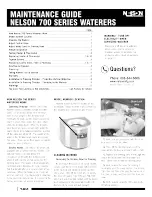
https://www.XPOtool.com
Item 63342, 63343, 63344, 63345, 63346, 63347
Page 7
The Tool Experts
05 2022
-1
Attention!
Never let the filter run dry!
5.
As soon as the water flow from the WASTE line has become steady, run the pump for additional
2
min or until the water coming out is clean. This first backwash of the filter is advisable to
remove contaminations and fine sand particles from the quartz sand media.
6.
Turn the pump off and set the control valve to “RINSE.” Make sure that all suction lines and
WASTE lines are open to allow the water to flow freely from the pool to the WASTE line. STAND
CLEAR OF THE FILTER and turn the pump on.
7.
Let the pump for a minimum of 2
min.
8.
Turn the pump off and set the control valve to “FILTER.” Make sure that all suction lines and
RETURN lines are open to allow the water to flow freely from the pool and back to the pool.
STAND CLEAR OF THE FILTER and turn the pump on.
9.
The filter now begins the filtering cycle. Make sure that the water returns to the pool and observe
the operating pressure of a clean water.
10.
Check if there is any water leak to the filter device. If water is leaking, turn the pump off before
repairing the leak.
11.
As the filter removes dirt and impurities from the pool water, the pressure will rise over time,
causing the flow rate to diminish. If the pressure gauge reading is 0.3–0.7
bar (5–10
psi) above
the operating pressure stated in the technical specifications, the filter needs to be backwashed.
Cleaning
1.
Operating a new pool, the filter must be backwashed after 48 operation hours and cleaned to
allow plaster dust and/or construction debris to be removed.
2.
There are three methods to determine the need of the filter being backwashed:
•
The most accurate indicator is a flow meter that the pool is equipped with. If the flow rate is
reduced by 30
% from the initial (clean-filter) flow rate, a backwash must be performed. —
Example: With a initial flow rate of 270
ℓ
⁄
min
, the filter requires backwashing if the flow rate is
reduced by 80
ℓ
⁄
min
(30
%) to 160
ℓ
⁄
min
.
•
A more subjective, though less accurate indicator is the observation of the quantity of the
water coming out the of flow directionals located in the wall of the pool. The filter should be
backwashed when the water quantity is reduced.
•
The most used indicator for the need of the filter being backwashed, that however is the
less accurate, is a rising pressure reading being 0.7
bar (10
psi) higher than the initial clean-
filter value.
3.
It is important that the backwash of the filter is not exclusively performed on time base, e.g.,
after every three days. Too high a backwash frequency might cause poor filtration. Weather
conditions, heavy rains, dust, pollen, water temperature, etc. do also affect the frequency of
backwashing. During the use of the pool, you will familiarise yourself with these factors.
4.
To avoid damages of the pump or filter and to ensure proper operation of the filtering system,
the pump strainer and skimmer baskets must be cleaned regularly.
5.
If after backwashing the starting pressure is 0.3–0.4
bar (4–6
psi) higher than then normal start-
ing pressure, the sand must be cleaned chemically.
Backwashing the filter
1.
Switch off the pump.
Warning!
Always turn the pump off before re-setting the control valve. When re-setting
the control valve during operation of the pump, the control valve can be damaged, leading to
serious damages and/or injuries.
2.
Make sure that all suction lines and WASTE lines are open to allow the water to flow freely from
the pool to the WASTE line. Set the control valve to the “BACKWASH” position.
3.
STAND CLEAR OF THE FILTER and turn the pump on.
4.
Perform backwashing of the filter during 3–5
min or until the water coming out is clean.
5.
Turn the pump off and set the control valve to “RINSE.”
6.
STAND CLEAR OF THE FILTER and turn the pump on.
7.
Rinse the filter during approx. 30 s.






























